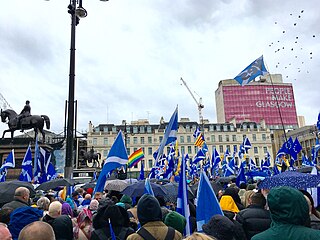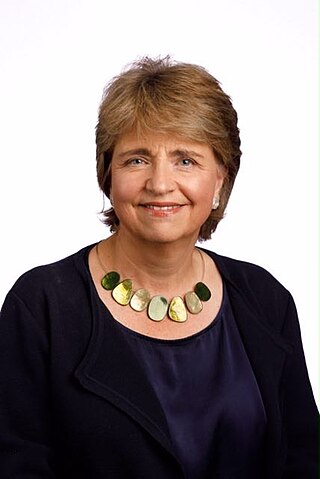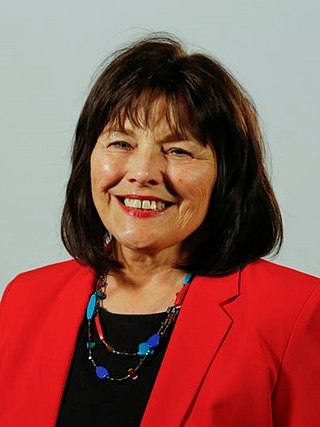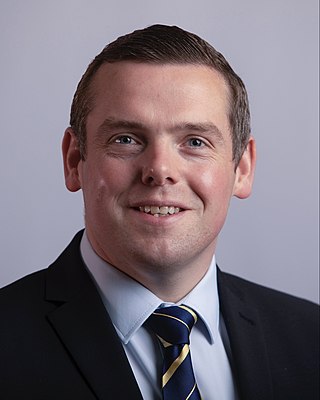Related Research Articles

Donald Campbell Dewar was a Scottish statesman and politician who served as the inaugural first minister of Scotland and leader of the Labour Party in Scotland from 1999 until his death in 2000. He previously served as Secretary of State for Scotland from 1997 to 1999. He was Member of Parliament (MP) for Glasgow Anniesland from 1978 to 2000. Dewar was also Member of the Scottish Parliament (MSP) for the equivalent seat from 1999 to 2000.

Scotland is a country that is part of the United Kingdom. It contains nearly one-third of the United Kingdom's land area, consisting of the northern part of the island of Great Britain and more than 790 adjacent islands, principally in the archipelagos of the Hebrides and the Northern Isles. To the south-east, Scotland has its only land border, which is 96 miles (154 km) long and shared with England; the country is surrounded by the Atlantic Ocean to the north and west, the North Sea to the north-east and east, and the Irish Sea to the south. The population in 2022 was 5,436,600 and accounts for 8% of the population of the UK. Edinburgh is the capital and Glasgow is the largest of the cities of Scotland.

Scottish independence is the idea of Scotland regaining its independence and once again becoming a sovereign state, independent from the United Kingdom. The term Scottish independence refers to the political movement that is campaigning to bring it about.

Alistair Maclean Darling, Baron Darling of Roulanish, was a British politician who served as Chancellor of the Exchequer under prime minister Gordon Brown from 2007 to 2010. A member of the Labour Party, he was a member of Parliament (MP) from 1987 to 2015, representing Edinburgh Central and Edinburgh South West.

Wendy Alexander is a retired Scottish politician and the former Member of the Scottish Parliament (MSP) for Paisley North. She held various Scottish Government cabinet posts and was the Leader of the Labour Party in Scotland from 2007 to 2008. In 2010–2011 she convened the Scotland Bill Committee on financial powers of the Scottish Parliament.

Jack Wilson McConnell, Baron McConnell of Glenscorrodale, is a Scottish politician who served as First Minister of Scotland and Leader of the Labour Party in Scotland from 2001 to 2007. McConnell served as the Minister for Finance from 1999 to 2000 and Minister for Education, Europe and External Affairs from 2000 to 2001. He has been a Labour life peer in the House of Lords since 2010 and previously served as a Member of the Scottish Parliament (MSP) for Motherwell and Wishaw from 1999 to 2011.

Henry Baird McLeish is a Scottish politician, author, academic and former professional footballer who served as First Minister of Scotland from 2000 to 2001. With a term of 1 year, 12 days, he is the shortest serving holder of that office. He served as the Leader of the Labour Party in Scotland from 2000 to 2001.

Johann MacDougall Lamont is a Scottish Labour Co-operative politician who served as Leader of the Scottish Labour Party from 2011 to 2014. She was previously a junior Scottish Executive minister from 2004 to 2007 and Deputy Leader of the Scottish Labour Party from 2008 until her election to the leadership in 2011. In addition to her ministerial and leadership roles, she has been a campaigner on equality issues and violence against women throughout her political career.

Scottish Labour, officially the Scottish Labour Party, is the part of the UK Labour Party active in Scotland. Ideologically social democratic and unionist, it holds 22 of 129 seats in the Scottish Parliament and 2 of 59 Scottish seats in the House of Commons. It is represented by 262 of the 1,227 local councillors across Scotland. The Scottish Labour party has no separate Chief Whip at Westminster.

The economy of Scotland is an open mixed economy and the second largest economy of the four countries of the United Kingdom. It had an estimated nominal gross domestic product (GDP) of £211.7 billion in 2023, including oil and gas extraction in the country's continental shelf region. Since the Acts of Union 1707, Scotland's economy has been closely aligned with the economy of the rest of the United Kingdom (UK), and England has historically been its main trading partner. Scotland conducts the majority of its trade within the UK: in 2017, Scotland's exports totalled £81.4 billion, of which £48.9 billion (60%) was within the UK, £14.9 billion with the European Union (EU), and £17.6 billion with other parts of the world. Scotland’s imports meanwhile totalled £94.4 billion including intra-UK trade leaving Scotland with a trade deficit of £10.4 billion in 2017.

Iain Cumming Gray is a Scottish politician who served as Leader of the Scottish Labour Party from 2008 to 2011. He was the Member of the Scottish Parliament (MSP) for the East Lothian constituency from 2007 to 2021, having previously represented Edinburgh Pentlands from 1999 to 2003. A former aid worker and teacher of mathematics and physics, Gray was first elected to the Scottish Parliament in 1999 as MSP for the Edinburgh Pentlands constituency, which he lost to Leader of the Scottish Conservative Party David McLetchie in 2003. Gray was returned to Holyrood in 2007 as MSP for East Lothian. Following Wendy Alexander's resignation as Leader of the Scottish Labour Party in 2008, Gray stood at the subsequent leadership election, and was elected with a 57.8% share of the vote in the second round.

The Cabinet Secretary for Wellbeing Economy, Fair Work and Energy, commonly referred to as the Wellbeing Economy Secretary, is a Scottish Government Cabinet position with responsibility for the economy of Scotland. The role in it current form is effectively a recreation of the former position of Cabinet Secretary for Economy, Jobs and Fair Work.
Full fiscal autonomy (FFA) – also known as devolution max, devo-max, or fiscal federalism – is a particular form of far-reaching devolution proposed for Scotland and for Wales. The term has come to describe a constitutional arrangement in which instead of receiving a block grant from His Majesty's Treasury as at present, the Scottish Parliament or the Senedd would receive all taxation levied in Scotland or Wales; it would be responsible for most spending in Scotland or Wales but make payments to the UK government to cover Scotland or Wales's share of the cost of providing certain UK-wide services, largely defence and foreign relations. Scottish/Welsh fiscal autonomy – stopping short of full political independence – is usually promoted by advocates of a federal United Kingdom.

Alexander Elliot Anderson Salmond is a Scottish politician, economist and television host, who served as First Minister of Scotland from 2007 to 2014. A prominent figure in the Scottish nationalist movement, he has served as Leader of the Alba Party since 2021. Salmond was leader of the Scottish National Party (SNP), on two occasions, from 1990 to 2000 and from 2004 to 2014. He served as the party's depute leader from 1987 to 1990. Salmond hosted The Alex Salmond Show (2017–2022) on RT UK. He currently hosts Scotland Speaks with Alex Salmond (2023–present).

A referendum on Scottish independence from the United Kingdom was held in Scotland on 18 September 2014. The referendum question was, "Should Scotland be an independent country?", which voters answered with "Yes" or "No". The "No" side won with 2,001,926 (55.3%) voting against independence and 1,617,989 (44.7%) voting in favour. The turnout of 84.6% was the highest recorded for an election or referendum in the United Kingdom since the January 1910 general election, which was held before the introduction of universal suffrage.

Jeane Tennent Freeman is a Scottish retired businesswoman and politician who served as Cabinet Secretary for Health and Sport from 2018 to 2021. A member of the Scottish National Party (SNP), she was the Member of the Scottish Parliament (MSP) for the Carrick, Cumnock and Doon Valley constituency from 2016 to 2021.

The Smith Commission was announced by Prime Minister David Cameron on 19 September 2014 in the wake of the 'No' vote in the 2014 Scottish independence referendum. The establishment of the commission was part of the process of fulfilling The Vow made by the leaders of the three main unionist parties during the last days of the referendum campaign. The Vow promised the devolution of more powers from the Parliament of the United Kingdom to the Scottish Parliament in the event of a No vote.

Scotland in Union (SIU) is a pro-UK campaign group, based in Scotland, which launched in March 2015 to help keep Scotland within the United Kingdom. Its supporters include members of pro-UK political parties and people with no party affiliation. It is Scotland's largest and most active pro-UK campaign group, with 38,000 signed up supporters.

In the Scottish Parliament, the Leader of the Opposition is an unofficial title held by the leader of the largest political party in the Scottish Parliament that is not in government. The role has also been referred to as the Shadow First Minister.
References
- ↑ Blair, Tony (16 March 2007). "We'd all be losers if the Union fell". Daily Telegraph. Retrieved 24 October 2010.
- ↑ Macwhirter, Iain (1 April 2007). "Labour seem determined to giftwrap the Scottish elections for the SNP". Sunday Herald.
- 1 2 Cochrane, Alan (28 September 2009). "Downgrading the British Army's presence in Scotland plays into the nationalists' hands". Daily Telegraph. Retrieved 24 October 2010.
- ↑ Macleod, Angus (7 July 2009). "Fears over Clyde yards put aside as work begins on carriers". The Times. Retrieved 24 October 2010.
- ↑ Dinwoodie, Robbie (23 October 2006). "McConnell rejects any constitutional tinkering and defends the 'union dividend'". The Herald.
- ↑ McConnell, Jack (16 January 2007). "We achieve more and are stronger together rather than on our own". Daily Record. Retrieved 24 October 2010.
- ↑ Alexander, Wendy (13 December 2007). "The Case For Union". Financial Times. Retrieved 24 October 2010.
- ↑ "Nuclear sub fleet moved to Clyde". BBC News. 6 May 2009. Retrieved 24 October 2010.
- 1 2 3 "Scottish independence: Rivals both say Scots 'better off with us'". BBC News. BBC. 28 May 2014. Retrieved 28 May 2014.
- ↑ "Asking the experts: What are economists saying about indyref figures?". BBC News. BBC. 28 May 2014. Retrieved 28 May 2014.